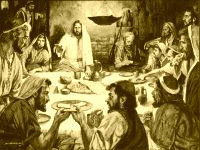 Another mistake liberal scholars make is o allegorize stories in the Bible. These folks regard biblical accounts as not being literal historical events but stories which make a moral point. For example, some scholars believe that Genesis chapter three is an allegory of how humanity lost its innocence as time went by.
Another mistake liberal scholars make is o allegorize stories in the Bible. These folks regard biblical accounts as not being literal historical events but stories which make a moral point. For example, some scholars believe that Genesis chapter three is an allegory of how humanity lost its innocence as time went by.Treating historical accounts as mere allegory is wrong. For many decades, liberal scholars believed the destruction of Jericho by the Israelites was a mere legend. Around a hundred years ago, archeologists found Jericho just as it had been described in the scriptures.
Just recently, the pool of Bethesda was uncovered by archeologists, proving the account in John 5:2 (KJV) correct. "Now there is at Jerusalem by the sheep market a pool, which is called in the Hebrew tongue Bethesda, having five porches."
Additionally, many Sunday school teachers incorrectly use historical accounts as moral lessons to their students. For example, the fight between David and Goliath is often told to teach children that we can tackle the "goliaths" in our lives.
Likewise, Daniel and his three companions are used as examples of how we must resist temptation to go along with the crowd. While those examples do show these traits, they are actual historical events rather than mere moral lessons.

Even the stories of Christ's miracles are trivialized through the allegorizing of them. But these are real events which happened to real people in real time, as we can read in Luke 1:2 (KJV). "Even as they delivered them unto us, which from the beginning were eyewitnesses, and ministers of the word;"
Additionally, 2 Peter 1:16 (KJV) affirms the factual nature of Christ's ministry. "For we have not followed cunningly devised fables, when we made known unto you the power and coming of our Lord Jesus Christ, but were eyewitnesses of his majesty."
John 12:16 (KJV) also points out the historicity of Scripture. "These things understood not his disciples at the first: but when Jesus was glorified, then remembered they that these things were written of him, and that they had done these things unto him."
Furthermore, Romans 15:4 (KJV) shows that the Old Testament was no mere collection of Jewish tales. "For whatsoever things were written aforetime were written for our learning, that we through patience and comfort of the scriptures might have hope."
And since these people were bearing witness of what happened, rather than glorifying themselves, we know the writings are true. As Jesus explained in John 7:18 (KJV), "He that speaketh of himself seeketh his own glory: but he that seeketh his glory that sent him, the same is true, and no unrighteousness is in him."
 Because we can believe the accuracy of the Bible, we can place full confidence in what it says. That's why I'm writing my book called You Think You're Going to Heaven? Far too many readers treat Holy Scriptures like a buffet where they can pick and choose what they like out of it. This is most certainly not correct.
Because we can believe the accuracy of the Bible, we can place full confidence in what it says. That's why I'm writing my book called You Think You're Going to Heaven? Far too many readers treat Holy Scriptures like a buffet where they can pick and choose what they like out of it. This is most certainly not correct.In my next post, I'll be writing about the error of spiritualizing the scriptures. Watch this space.
No comments:
Post a Comment
Please leave me a comment on this blog. All reasonable comments will be published.